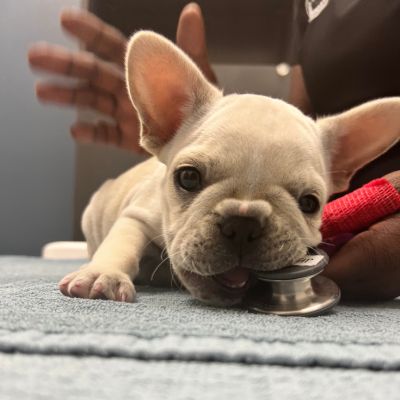Puppy Care
Let us help you in taking care of your new puppy! We have all the tips and tricks to make your puppy care the best it can be.
What To Expect When You’re Expecting a Puppy
Congratulations on your new member of the family! A new puppy is a lot of joy and a new responsibility. Your puppy, like a human baby, needs special care. We believe in progressive health care to help ensure a long, happy, and healthy life.
This calls for frequent visits to the vet during the first few months of life. Broadway Animal Care is here to partner with you to provide all of the care and support your puppy needs to grow into a happy, healthy dog. Here is a handy checklist that we can both use to make sure we do everything we need to for your puppy.
Step 1: Vaccinations
Getting vaccinations is crucial for preventing various life-threatening diseases such as distemper, hepatitis, parainfluenza virus, parvovirus, Bordetella, and rabies. To ensure effectiveness, puppies must receive a series of vaccinations, and then continue receiving them at least once a year. Depending on your pet’s individual situation, additional vaccinations may also be necessary.
Step 2: Worm & Parasite Treatment
It is common for puppies to have worms and parasites since they can get infected before or after birth. We suggest that you bring your puppy for a fecal exam when you come to see us and provide us with a stool sample if possible. Our vet will examine the sample under a microscope to identify any worms or other gastrointestinal parasites that may be present.
We suggest giving your puppy a safe and effective deworming product twice, three weeks apart, even if a fecal examination is not done. This dewormer has no side effects and can treat various common worms. Along with treating any worms that may be present in the future, it’s crucial to provide preventive treatment for heartworms in your dog’s life.
Step 3: Microchipping
If you want to make sure you can find your puppy if you get separated, consider microchipping them. Broadway Animal Hospital offers a non-surgical procedure where they insert a small chip that can be scanned for information. You just need to register your details with a service. Then, if someone finds your pet, any vet clinic can scan the chip to track your information.
Step 4: Spaying/Neutering
Getting your pet spayed or neutered can improve their quality of life. This procedure can provide medical benefits that promote long-term health, and can also lead to behavioral changes that reduce anxiety and improve your pet’s relationship with you. However, it’s important to note that behavioral changes are not guaranteed, and may vary depending on your pet’s individual personality and traits. Rest assured that we take every precaution to ensure that the procedure is as safe and painless as possible for your dog.
Step 5: Flea & Tick Treatment
It is important to maintain flea and tick prevention and treatment for your puppy’s health. While prescription medications are effective, it’s important to use caution to prevent adverse reactions. We can guide you on the best treatment, timing, dosage, and application for your dog.
Step 6: Establish a Nutrition & Exercise Routine
To take care of your new pet, focus on their nutrition and exercise. Feeding and exercising your puppy will depend on their individual needs. Typically, puppies need to eat more frequently but in smaller amounts compared to adult dogs. Additionally, puppies need ample play and exercise for proper muscle development.
Step 7: Socializing & Training
Socialization and behavior training is the key to raising a well-behaved dog. Broadway Animal Hospital is here to guide you on the best way to train your puppy so that you can maximize good behavior and minimize the bad. Training your dog does require some consistency and work, but the rewards are well worth it.


